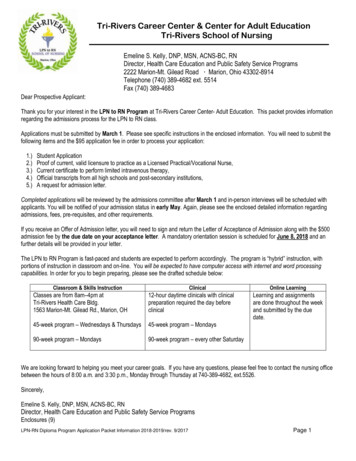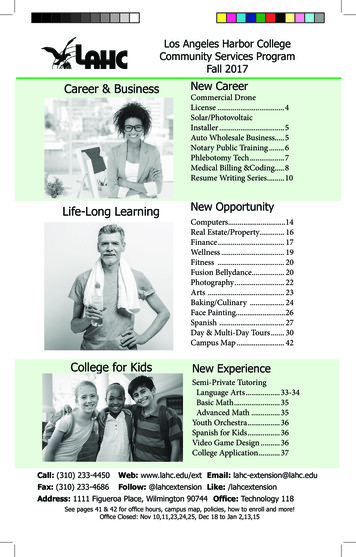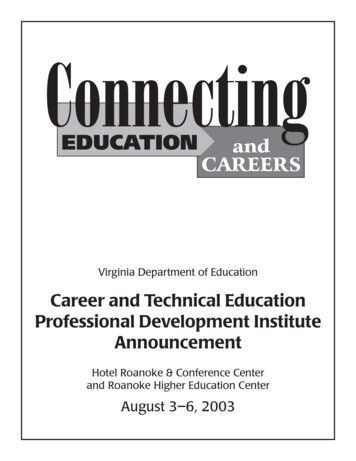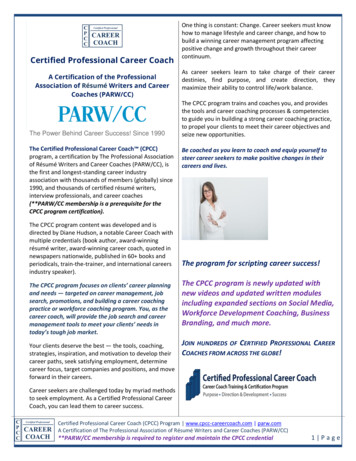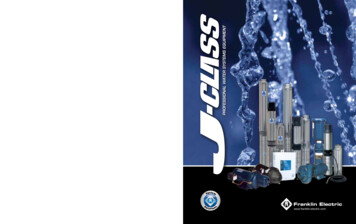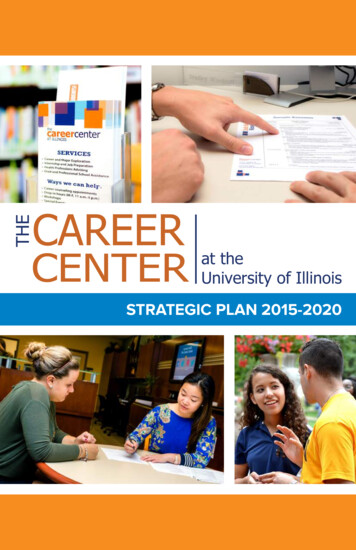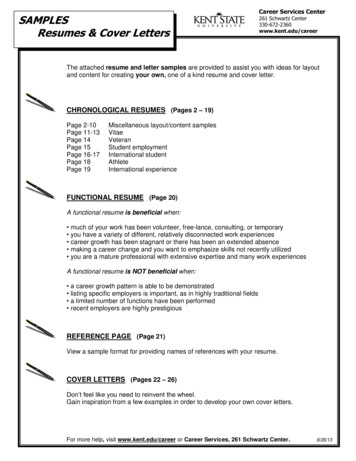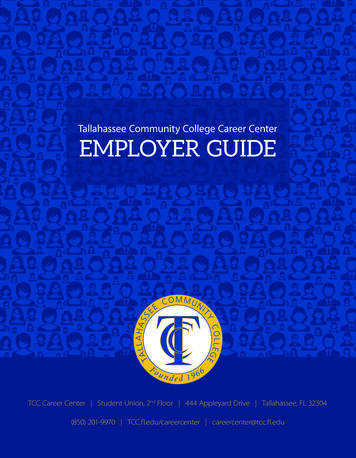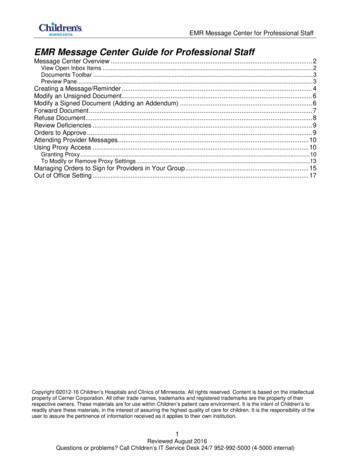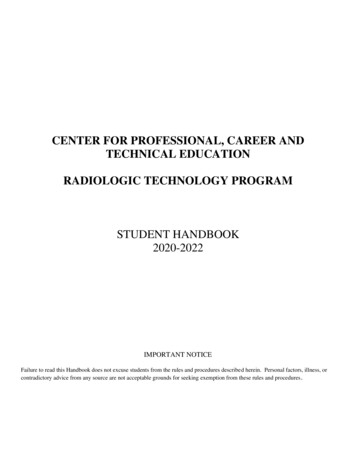
Transcription
CENTER FOR PROFESSIONAL, CAREER ANDTECHNICAL EDUCATIONRADIOLOGIC TECHNOLOGY PROGRAMSTUDENT HANDBOOK2020-2022IMPORTANT NOTICEFailure to read this Handbook does not excuse students from the rules and procedures described herein. Personal factors, illness, orcontradictory advice from any source are not acceptable grounds for seeking exemption from these rules and procedures .
2WelcomeCongratulations! You have been selected as a member of the next Radiologic Technology class. You havechosen an exciting and rewarding profession, and this program will strive to provide you with the educationalexperiences necessary to prepare you for a career in a radiology setting.The program was established in 1967 and has graduated many qualified RTs over the years. While most havebeen employed in hospitals, clinics, and Doctor's offices around the city and state, some have chosen tocontinue their education and earn higher degrees in radiologic sciences or related disciplines.During the next five semesters, you will be required to devote many hours of study and preparation to gain theknowledge and practical experiences needed to successfully enter a career in radiology. I believe you will findthat your hard work is well worth the effort!Wishing you much success,Christie Bolton, M.A.Ed., R.T. (R)Radiologic Technology Program DirectorJefferson State Community College
3Program Mission Statement and GoalsThe mission of the Radiologic Technology Program at Jefferson State Community College is to preparegraduates for entry-level employment as a radiologic technologist in the healthcare community.This program mission is consistent with the colleges Statement of Philosophy and Purpose in the Jefferson StateCommunity College Catalog and Student Handbook.Program Goals:The program mission can be met by the achievement of the following goals:1.Students will demonstrate clinical competence.Student Learning Outcomes:Students will apply positioning skills.Student will select appropriate technical factors.Students will practice radiation protection.2.Students will effectively communicate.Student Learning Outcomes:Students will use effective oral communication skills.Students will practice written communication skills.3.Students will utilize critical thinking skills.Student Learning Outcomes:Students will manipulate technical factors for non-routine examinations.Students will adapt positioning for trauma patients.4.Students will evaluate the importance of professionalism.Student Learning Outcomes:Students will develop a professional resume.Students will exhibit professional behaviors such as punctuality in the clinical setting.5.Provide qualified radiographers to meet the health care needs of the community.Student Learning Outcomes:Students will pass the ARRT national certification on the first attempt.Students will complete the program according to program guidelines.Students will be satisfied with their education.Employers will be satisfied with the graduate’s performance.Of those pursuing employment, students will be gainfully employed within six months postgraduation.Radiologic Technology Program AccreditationThe Radiologic Technology Program at Jefferson State Community College is accredited by the Joint ReviewCommittee on Education in Radiologic Technology. The JRCERT develops educational standards that areaccepted by professionals in the radiologic sciences. They are the only organization recognized by the U. S.Department of Education to evaluate and accredit education programs in radiography. A copy of theSTANDARDS is available at www.jrcert.org. To learn more about the JRCERT or the standards contactJRCERT at:20N Wacker Drive, Suite 2850Chicago, IL 60606-3182Tel: (312) 704-5300Fax: (312) 704-5304For resolutions of non-compliance, students have the option to follow Jefferson State Community Colleges dueprocess as outlined in the college catalog and student handbook or have non-compliance concerns addresseddirectly to the JRCERT at the above mentioned address.
4TABLE OF CONTENTSMission Statement / Program GoalsRadiologic Technology AccreditationRAD Advisory CommitteeThe Educational ExperienceProgression GuidelinesRegular ProgressionOut of ProgressionReadmissionReadmission DenialDismissalDrug Screening PolicyDrug Screening Participation FormBackground Screening PolicyBackground Screening Participation formCode of EthicsEligibility for CertificationGeneral InformationThe Family Educational and Privacy Rights ActEqual Opportunity StatementRehabilitation ActAmericans with Disabilities ActPolicy on AIDSCOVID / Coronavirus PolicyCOVID Liability WaiverStudent ServicesFood ServicesHousingLost and FoundPioneer BookstoreTelephone UseEmergency MessagesFinancial ConcernsLearning Resources CenterOther ServicesCopier UseHealth and InsuranceSecurity of Personal PropertyIdentification CardsSmoke Free Campus PolicyStudent ActivitiesCampus 42425262727272727272828293030303131313232
5Professional OrganizationsStudent ConductAcademic Honesty CodeDrug and Alcohol Free CampusDisciplinary Procedures for Students in Clinical AffiliateRotationComplaint ResolutionProgram InformationGrading PolicyProgression and Readmission PolicyClass Attendance PolicyClinical Education HoursClinical Education Attendance RegulationsWithdrawal InformationGuidelines for Clinical Students in RotationClinical Education EligibilityClinical AssignmentsClinical EducationSupervision of StudentsRepeat PolicyRadiation Protection Policy and PracticeDress CodeClinical Education ReportsClinical Education Rotation RegulationsNursing Mothers and Lactation SupportExposure to Blood and Body FluidsIncident Accident ReportPregnancy PolicyAcknowledgment of Pregnancy PolicyOptions for Pregnancy PolicyRadiation Protection Policy/Recommended Radiation Dose LimitsMRI Safety PolicyMRI ScreeningMRI Safety Policy AcknowledgmentIllness and Communicable DiseaseInjury/Exposure to Contagious Disease or Workplace HazardStudent Illness/InjuryClinical CompetencyClinical Performance Grading SystemRAD 112 Lab CompetenciesRAD 122 Lab CompetenciesProgram 34344464849505152535455555556596263
6Semester Course SequenceDaily Report of Clinical ExperienceProfessional Disciplinary WarningGrading FormsRAD 114RAD 124, 134, 214, 224Repeatable errors FormMedical FormHIPAA FormAcknowledgement of Student Handbook64656667676974757879
7JSCC Radiologic Technology ProgramADVISORY COMMITTEEProgram OfficialsChristie W. Bolton M. A. Ed., R.T. (R)Radiologic Technology Program CoordinatorAnnette W. Ferguson, M. S. R. S., R.T. (R)Radiologic Technology Clinical CoordinatorAmi Poe, BS, R.T. (R)Radiologic Technology Lab InstructorMembersShannon Hamilton, Committee ChairpersonAdministrator, St. Vincent’s ChiltonKeith CorsonChief Technologist, RadiologySt. Vincent’s EastBettye G. WilsonUAB RetiredALSRT and ARRT RepresentativeAuthur BaldridgeDirector of RadiologySt. Clair Regional HospitalEric WilliamsManager RadiologyUAB HospitalLee MorrisonDirector of RadiologyMedical WestTerri FranklinRadiology ManagerUAB HighlandsJim NanceInterim Director of RadiologyBaptist Medical Center PrincetonBrad WidemanDirector of Imaging ServicesBrookwood Medical CenterDiane BarineauDirector of RadiologyBaptist Medical Center ShelbyJeff McGoughDirector of RadiologyKirklin ClinicLynne HamerDivisional DirectorChildren’s HospitalReed AdairDirector of Clinical ServicesSt. Vincent’s BirminghamSusan IrwinDirector of ImagingGrandview HospitalSouthlake OrthopaedicsBrandy MooreOperations ManagerOrtho AlabamaLena CollinsRadiologic TechnologistVA of BirminghamRainey VarnerChief RT and Radiation Safety OfficerChildren’s SouthJackie CanterPediatric Imaging Center Manager
8Clinical InstructorsShalanda ReevesSt. Vincent’s BirminghamSandy BlockerUAB Medical WestGina GrahamPrincetonErin LangworthyPrincetonSonya PayneSt. Vincent’s EastChristy RobertsonThe Children’s Hospital of AlabamaKim MossSt. Vincent’s, St. ClairChelsey MosleyUAB HospitalTiffany BoltonUAB HospitalKatelyn FineKirklin ClinicAnna HamiltonUAB HighlandsKathryn FisherBrookwood BaptistKrista RohrabaughBrookwood BaptistDaniel EvansShelby BaptistAmy BurchGrandview HospitalAlicia IngramSt. Vincent’s ChiltonBrooke RobertsSouthlake OrthopaedicsDawn CarterSouthlake OrthopaedicsRyan TollisonOrthopaedics of AlabamaMonica WattsVA BirminghamJessica StricklandChildren’s SouthStudent RepresentativeAssociation of Radiologic Technology StudentsPresidentUpdated August 2020
9THE EDUCATIONAL EXPERIENCEMany new students do not know what a good college student is or what a good college student does. Theyunderstand good and bad grades in a general way, and they sense that they should attend classes; but that iswhere their knowledge begins and ends. Most teachers know what a good student is--and is not. For one thing,a good student is not necessarily the most intelligent individual in a class. But a good student does have someclearly identifiable attributes.What are the Characteristics of Successful Students?1.Not surprisingly, they attend classes--regularly. Moreover, they are on time. If they miss a session, theyfeel obligated to let the instructor know why, and their excuses seem legitimate and reasonable. Theymake sure they get all assignments they missed and understand specifically what was covered in class.2.They take advantage of extra credit opportunities if they are offered. They demonstrate that they careabout their grades and are willing to work to improve them. They often do the optional, and frequentlychallenging, assignments that many students pass up, such as giving a five-minute presentation thosesubstitutes for an essay.3.Successful students speak in class, even if their attempts are a bit clumsy and difficult. They ask thequestions that the instructor knows many in the class are bound to have, provided they are listening.4.They see the instructor before or after class about grades, comments made on their papers, andupcoming tests. Sometimes they just want to ask a question or make a comment relative to the classdiscussion.5.Successful students turn in assignments that look neat and sharp. They take the time to produce a finalproduct that looks good, a reflection of a caring attitude and pride in their work.6.They are attentive in class. They don't chat, read, or stare out windows. In other words, they are politeand graceful, even if they get a little bored.7.All work and assignments are turned in, even if every one of them is not brilliant. Successful studentsseem driven to complete all work.8.The most successful students may well end up at the instructor's office door at least once during thesemester. They'll go out of their way to find the instructor and engage him/her in meaningfulconversation.The above "characteristics" were written by David Shunts in "Innovation Abstracts" Vol. X, No. 17; publishedby the National Institute for Staff and Organizational Development. However, they could have been written byyour college faculty as they reflect our observations as well. Our purpose here is to assist you in learning butyou must do your part. If you need help with study skills, act early. Contact the Learning Success Center nowand develop a plan for success.While class attendance and participation are very important, a college education involves much more. Theintellectual and social climate of the college seeks to broaden horizons as well as to provide skills andknowledge necessary to pursue a given career. We feel the information will help you participate fully in theeducational experience.
10JSCC Radiologic Technology ProgramPROGRESSION GUIDELINESI.REGULAR PROGRESSIONA. IN ORDER TO SUCCESSFULLY COMPLETE THE RADIOLOGIC TECHNOLOGYPROGRAM, STUDENTS MUST FULFILL ALL OF THE FOLLOWING REQUIREMENTS:B.1.Progress through all required general education courses in the radiologic technologyprogram curriculum, including prerequisites and co-requisites, in a sequence approved bythe radiologic technology program2.Progress through all radiography program courses, including prerequisites and corequisites, in the sequence specified by the radiography program faculty3.Attain grades of “C” or above in each of the required radiologic technology and generaleducation courses in the curriculum without repeated withdrawals, audits, or failures4.Maintain a grade-point average of 2.5 or above (4.00 grade scale) on all college creditsand on Jefferson State Community College credits.5.Maintain current radiologic technology student liability insurance, drug screening,personal health/hospitalization insurance, background checks and radiation dosimetermonitoring6.Submit completed medical form by required date7.Maintain a satisfactory level of health, including freedom from chemical dependency andcontinuously able to meet the Essential Functions as outlined on the radiologictechnology program application8.Maintain current certification in cardiopulmonary resuscitation at the health care providerlevel9.Refrain from conduct that violates the College’s Academic Honesty Code, the Code ofStudent Conduct, and the Drug and Alcohol Free Campus Policy10.Refrain from conduct that violates the ARRT Code of Ethics and that which leads to amajor breach in safety, confidentiality, legality, or accountability11.Comply with all progression requirements according to progression guidelines of RADcourses in order to remain in the program and graduateSTUDENTS SHOULD SCHEDULE APPOINTMENTS WITH A PROGRAM FACULTYADVISOR TO DISCUSS THE ABOVE REQUIREMENTS AS NEEDED
11II.OUT OF PROGRESSIONA.THE STUDENT IS CONSIDERED TO BE OUT OF PROGRESSION IF HE/SHE:1.Fails to progress through all required general education courses in the radiologictechnology curriculum, including prerequisites and co-requisites, in a sequence approvedby the radiologic technology program faculty2.Fails to progress through all required radiologic technology courses in the curriculum,including prerequisites and co-requisites, in a sequence approved by the radiologictechnology programa.Students should not withdraw from required radiologic technology or generaleducation courses without advisement from their assigned radiography programfaculty advisor, since this will interrupt the student’s progression into the next termof the radiologic technology curriculum.b.A student who withdraws from a required radiologic technology or generaleducation course must complete the readmission procedures3.Failure to attain grades of “C” or above in each of the required general education courses inthe radiologic technology program curriculum.a.A student who fails to attain a grade of “C” or above in each of the required generaleducation courses must repeat the course successfullyb.Application for readmission may be made before the final grade is known.However, if readmission is achieved, it will be conditional, based upon successfulcourse completion (i.e. attains a grade of “C” or above)4.Fails to attain grades of “C” or above in each of the required radiologic technology coursesin the curriculuma.A student who fails to attain a grade of “C” or above in a radiologic technologycourse must achieve readmission and successfully repeat the radiologic technologycourse and revalidate prescribed laboratory, patient care and competencyexaminations prior to readmission5.b.A student who does not achieve readmission within twelve (12) months of the lastclass day of the term in which the student’s progression was interrupted will notbe considered for readmissionc.A student may repeat a radiologic technology course onceFails to maintain a grade point average of 2.5 or above (4.00 scale) on all college creditand on Jefferson State Community College credit6.Fails to maintain current student liability insurance, drug screening, personalhealth/hospitalization insurance, background checks and radiation dosimeter monitoring7.Fails to submit completed medical forms by the required date8.Fails to maintain a satisfactory level of health, including freedom from chemicaldependency and maintain Essential Functions during admission
129.10.B.III.Fails to maintain current certification in cardiopulmonary resuscitation at the healthprovider levelFails to comply with all progression requirements in order to graduateANY STUDENT WHOSE PROGRESSION THROUGH THE RADIOLOGIC TECHNOLOGYPROGRAM IS INTERRUPTED MUST REAPPLYREADMISSION PROCEDURESA.B.STUDENTS WHOSE PROGRESSION THROUGH THE RADIOLOGIC TECHNOLOGYPROGRAM IS INTERRUPTED AND WHO DESIRE TO BE READMITTED MUSTREMEDY ALL CONDITIONS THAT PRODUCED THE OUT OF PROGRESSION STATUSBY THE END OF THE TERM PRIOR TO THE TERM IN WHICH THE STUDENT’SPROGRESSION WAS INTERRUPTED1.Prior to the beginning of the term immediately preceding the term of readmission, thestudent must submit a letter to the Radiologic Technology Program Coordinatorrequesting readmission. The student should include statements in the letter explainingreasons for the out of progression status, any actions taken to comply with requirements,and any special request regarding the remaining curricular sequence.2.Schedule an appointment with a radiologic technology program coordinator for assistancein planning readmission.3.Meet the conditions and complete the activities prescribed within the specified time limit.(i.e. completed medical form, current CPR certification, proof of health/hospitalizationinsurance, drug screening, background checks, student liability insurance, and radiationdosimeter, meeting Essential Functions, repeating required competencies in the lab,patient care and in the clinical setting, completing clinical requirements and testing out ofRAD courses previously completed with a 75% or higher).4.Failure in the first semester of the RAD program will require the student to reapply andbe readmitted.AFTER REMEDYING THE CIRCUMSTANCES WHICH INTERRUPTED PROGRESSION,IN ORDER TO BE CONSIDERED FOR READMISSION, THE STUDENT MUST:1.Complete the required radiologic technology program admissions application.2.Complete any conditions as prescribed by the program coordinator.3.The student will be notified prior to the appropriate registration date if the request forreadmission is approved or denied. Readmission eligibility and placement aredetermined by the radiologic technology program faculty and prescribed met conditions.4.If readmission is granted, the student must submit official transcripts from othercolleges or universities attended while out of progression by the designated date
13IV.C.ANY CHANGES IN THE RADIOLOGIC TECHNOLOGY PROGRAM AND STUDENTCLINICAL EDUCATION HANDBOOK WILL BE APPLICABLE TO ANY STUDENT UPONREADMISSIOND.READMISSION TO THE RADIOLOGIC TECHNOLOGY PROGRAM IS NOTGUARANTEED EVEN IF A STUDENT MEETS ALL REQUIREMENTS FOR READMISSION(see section IV)READMISSION DENIALA.B.A STUDENT MAY BE DENIED READMISSION DUE TO, BUT NOT LIMITED TO, ANY OFTHE FOLLOWING CIRCUMSTANCES:1.Remedies to remove out of progression status are incomplete or inadequate2.Space is unavailable in the course to which the student reapplies. Space availability isdetermined by the radiologic technology program. Students in regular progression haveenrollment priority.3.Transcripts, documents, forms, certification, drug screening, insurance, and other requiredrecords have not been submitted as required or are incomplete4.Grade point average is less than 2.5 on all college credit or on Jefferson State CommunityCollege credit.5.Health status is such that placement of the student in required didactic classes, laboratoriesor clinical education sites may pose a health, safety or legal risk to the student, the patientsin the care of that student, or the clinical education site6.A review of the student’s records indicates that readmission is not in the best interest of thestudent or potentially assigned patients or will cause the radiologic technology program toviolate the policies, professional or legal rules, regulations, or ethical principles
Nursing Mothers and Lactation Support 43 . Chief Technologist, Radiology UAB Retired . 2. Progress through all radiography program courses, including prerequisites and co-requisites, in the sequence specified by the radiography program faculty 3. Attain grades of “C” or above
